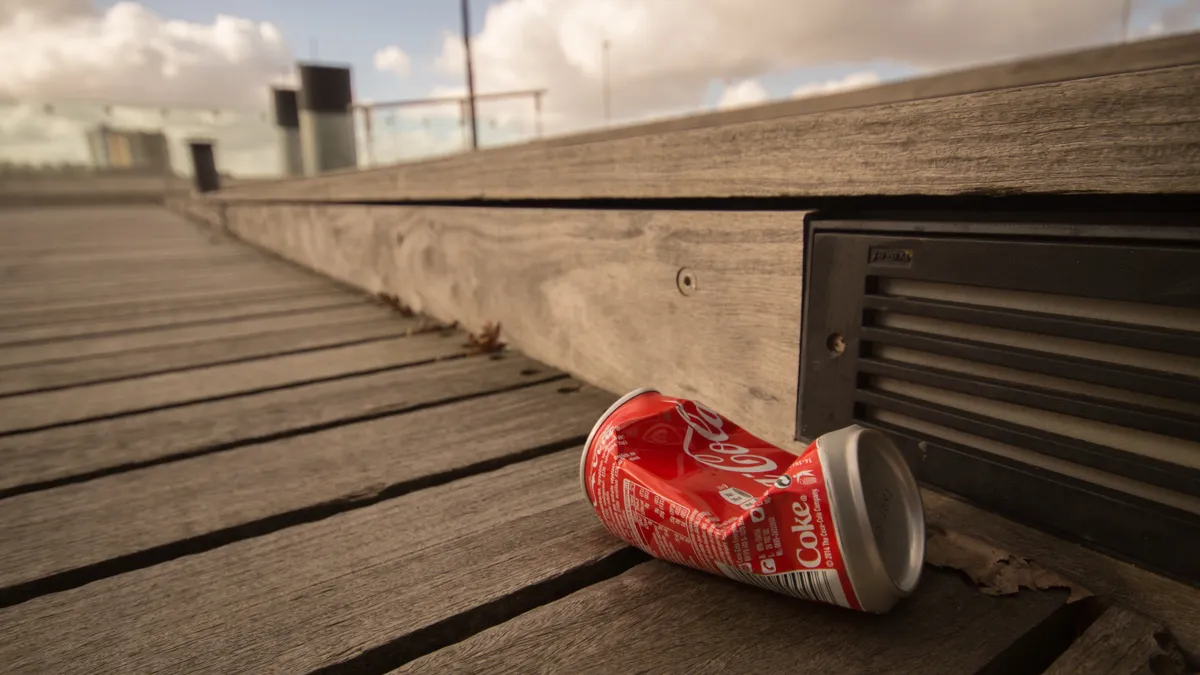Dive Brief:
- The Coca-Cola Foundation has pledged $5.4 million worth of recycling grants to programs in multiple cities in an effort to help "fix" recycling infrastructure in the U.S., as first reported by CNN Business.
- An estimated $4.15 million of this funding will go toward a three-year curbside education program in Atlanta being done in conjunction with The Recycling Partnership. The stated goals are to reduce contamination by more than 25% and increase capture rates by 20% across 100,000 households. The nonprofit will also be working with local multi-family buildings, colleges and universities.
- The remainder of this grant funding will go to groups including Keep Houston Beautiful, the Boston Parks and Recreation Foundation and GreenBlue for work it's doing in Orlando. The latter program involves a $193,000 grant, also working with The Recycling Partnership, to help expand an existing curbside quality program in Florida's Orange County.
Dive Insight:
The new pledge is the latest in a series of recycling grants from the global food and beverage company, which has come under scrutiny for its role in the mounting plastic waste problem. Historically resistant to any major regulatory changes that some believe could address this in the U.S. — such as bottle bills or extended producer responsibility concepts — Coca-Cola has instead sought absolution through voluntary avenues.
Last summer, the company pledged $1 million to The Recycling Partnership for coastal recycling programs to mitigate marine debris. Later in the year, the Coca-Cola Foundation announced a $500,000 grant to the Southeast Recycling Development Council for regional infrastructure as well as a $15 million contribution to Circulate Capital for marine debris investments.
These donations are just a handful of the many millions Coca-Cola or its foundation have put toward recycling programs via The Recycling Partnership, Closed Loop Fund, Keep America Beautiful and other groups. Its messaging has ramped up even more over the past year following the announcement of "World Without Waste" goals to "help collect and recycle a bottle or a can for each one we sell by 2030," "make our packaging 100 percent recyclable by 2025" and "use 50 percent recycled material in our bottles and cans by 2030."
Due to its frequent success in municipalities around the country, The Recycling Partnership has become an popular partner to which to dole out funding. During its own 2017 pilot across 5,000 households in Atlanta, the national nonprofit reported a 27% increase in capture rates and 57% decrease in contamination. This model of curbside inspections and cart-tagging has taken off around the country, including in Florida's Orange County, where a program was first launched in 2018.
While such big dollar amounts often yield tangible results and good headlines, they still may not be a match for negative public perception — PepsiCo's $10 million pledge to The Recycling Partnership last year, for example, was criticized as insufficient.
Products from these major food and beverage makers are still frequently showing up as litter or marine debris, and the companies have shown minimal interest in encouraging actual waste reduction versus recycling. Coca-Cola and PepsiCo are both participating in a new reusable container pilot called Loop, but their products will initially be available only in France. Moreover, a new report from the Ellen MacArthur Foundation shows Coca-Cola is producing an estimated 3 million metric tons of plastic packaging per year – the equivalent of 200,000 bottles per minute.
The company and its partners dispute these critiques, pointing toward their ongoing financial support for recycling programs and participation in the dialogue. A Coca-Cola representative laid out this messaging during last fall's EPA Recycling Summit in Washington, D.C.
“We know that packaging waste is a problem. It’s a global problem and we know our packages are contributing to that problem," said Ryan Guthrie, group director of federal government relations, before pledging to invest in collaborative solutions that don't expect any one entity to go it alone. "It’s good for our planet, it’s good for our communities, and frankly it’s good for business — and so we’re committed to it at Coca Cola."














